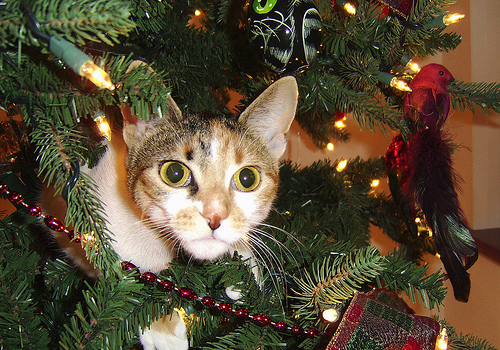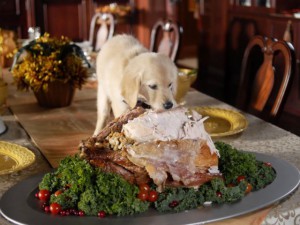Christmas Pet Safety Tips

No one wants to end up in our emergency room over the holidays! Consider these risks to reduce the likelihood that we will need to see you!
Holiday Ornaments: Consider any new decoration you put out! This is especially important with young dogs and cats who are typically more boisterous and curious, and also with any pets new to the household.
- Candles are an obvious risk. Place carefully and always supervise or consider flameless candles.
- Ornaments pose several risks. How breakable? How dangerously chewable? Are they toxic? Homemade salt dough ornaments are extremely toxic.
- New cords (for lights, etc.) can and will be investigated by a curious young dog or cat. Also assess risk of entanglement.
- Tinsel: If you own a cat, forgo the tinsel. What looks like a shiny toy to your cat can prove deadly if ingested. Tinsel does not pose a poisoning risk, but is thin and sharp and can easily wrap itself around the intestines or ball up in the stomach once ingested. Many unfortunate cats have required emergency surgery to save them once the tinsel has caused obstruction or other problems.
- Imported Snow Globes: Recently, imported snow globes were found to contain antifreeze (ethylene glycol.) As little as one teaspoon of antifreeze when ingested by a cat or a tablespoon or two for a dog (depending on their size), can be fatal. Be sure snow globes are placed where they cannot be knocked over and broken.
- Liquid Potpourri: Filling your house with holiday scents is wonderful, but heating your scented oils in a simmer pot can pose risks. Scented oils can cause serious harm to your cat, with just a few licks resulting in severe chemical burns in the mouth, fever, difficulty breathing, and tremors. Dogs aren’t as sensitive, but it’s still better to be safe than sorry. Simmer natural scents (orange, cinnamon, etc.) on the stove, or scent your home with a non-toxic candle kept safely out of your pet’s reach.

Holiday Foods: With the holiday season comes a delightful variety of baked goods, chocolates, and other rich, fattening foods. Do your best to keep your pet on his or her regular diet over the holidays and do not let family and friends sneak in treats.
- Chocolate and cocoa contain theobromine, a chemical highly toxic to dogs and cats. Ingestion in small amounts can cause vomiting and diarrhea but large amounts can cause seizures and heart arrhythmias.
- Holiday baked goods are typically too high in sugar to be good for our pets in any form. Increasingly, many sugarless gums and candies also contain xylitol, a sweetener which is toxic to dogs. It causes a life-threatening drop in blood sugar and potential liver failure. It is also contained in some brands of peanut butter.
- Grapes and raisins can result in kidney failure in dogs — another check against fruitcake!
- Alcohol: Because alcohol is rapidly absorbed into the bloodstream, it affects pets quickly. Ingestion of alcohol can cause dangerous drops in blood sugar, blood pressure and body temperature. Intoxicated animals can experience seizures and respiratory failure.
- Yeasted dough: Raw dough can expand in a pet’s stomach and require emergency surgery. It may also cause alcohol poisoning as the yeast reacts in the stomach. Make sure that rising dough is well out of reach.
- Overfeeding and “Garbage Gut”: A very common reason for a holiday trip to the veterinary emergency room unfolds innocently in a busy holiday household. The meal is over and everyone is too full to pay attention to where the leftover food is in relation to your pets. Your pets have been waiting literally all day for such an opportunity, and are busily helping themselves to the overstuffed trash container and/or the leftovers on the counter. While dogs are usually the main offenders in cases of “garbage gut,” cats are not immune! Within a few hours some combination of vomiting and diarrhea requires a trip to the emergency room. Leftover, fatty meat scraps can produce severe inflammation of the pancreas (pancreatitis) leading to abdominal pain, vomiting and bloody diarrhea. It’s one thing if you occasionally give a little nibble of something to your pet, but if all 20 party guests decide to do the same, you can wind up with a seriously ill pet.

Holiday Plants: Cats are usually most apt to “sample” your houseplants. Veterinary advice should be sought if any of these plants are suspected of being ingested!
- Lilies (including tiger, Asiatic, Stargazer, Easter and Day lilies) are the most dangerous plants for cats. The ingestion of one to two leaves or flower petals is enough to cause sudden kidney failure. We do NOT recommend any lilies in cat owning households!
- Daffodils (including paperwhites) can cause severe vomiting, diarrhea, abdominal pain, and even possible cardiac arrhythmias or respiratory depression. The bulb, plant, and flower are all toxic.
- Holly is toxic, and can cause severe gastrointestinal upset and even heart arrhythmias.
- Mistletoe: Both berries and leaves are toxic, and symptoms of toxicity include gastrointestinal upset, difficulty breathing, slowed heart rate, low blood pressure, and odd behavior (possible hallucinations).
- Amaryllis causes vomiting, diarrhea, abdominal pain, lethargy, and tremors. The entire plant including the bulb is dangerous
- Christmas tree and tree water: Bacteria, molds, and fertilizers can cause your pet to become ill with only a few laps, and both dogs and cats are at risk. Chewing on the tree itself can cause some more mild oral and gastrointestinal upset, and there is a small chance that needles can cause punctures and other gastrointestinal problems.
- Though they have a bad rap, poinsettia plants are only mildly toxic. The effects are typically “self limiting” – chewing them is unpleasant, they taste bad, and then whatever little amount is eaten is fairly quickly thrown up. Pesticides on the plants are likely of more concern.
Houseguests and Holiday Hustle and Bustle Any time you stray from your normal routine or introduce people unfamiliar with your routine into your household, there is the possibility of your pets finding some trouble, including:
- Escape
- Overfeeding of unfamiliar or inappropriate foods
- Ingesting guest’s medication
- Stress!
Gates and doors left open, dietary indiscretion, guests leaving their medications in a place where your pet can “investigate”, and a host of other scenarios can create problems for your pets.
Keep your pet’s ID tags current and on your pet, and help your guests “Pet Proof” their belongings. This is the time to alert your guests of any “special” habits your pet may have (sock stealing/eating, etc.) so they can prepare.
Also remember that changes in routine can stress your pets, especially cats and older pets. Consider giving them a quiet space of their own to get away from the festivities if they don’t seem relaxed and content.
A little bit of prevention can help ensure that your holidays are happy, healthy, and spent at home!
About Us
At Veterinary Medical Center of Central New York, we understand that the health of your pet is a top priority. In the case of an emergency or a condition requiring specialized care, we're here to treat your pet in our state-of-the-art, 24-hour Emergency and Critical Care Center.
